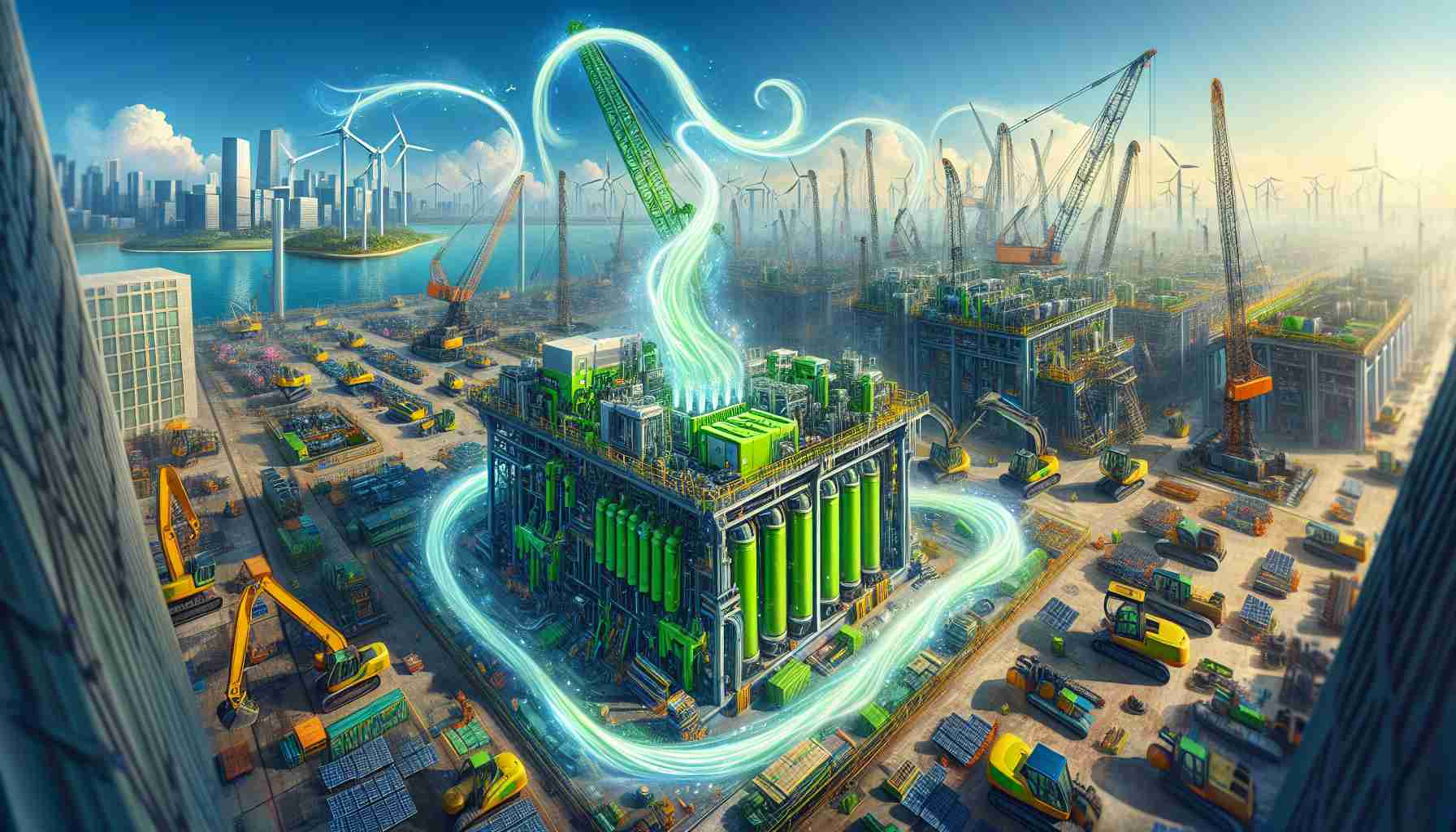- GeoPura’s hydrogen power units (HPUs) provide a clean alternative to diesel generators, producing only water vapor as a byproduct.
- The technology is versatile, applicable across various sectors, including construction, live events, and film productions.
- Green hydrogen, produced through electrolysis using renewable energy, is the foundation of GeoPura’s innovation.
- GeoPura produces six metric tons of green hydrogen weekly, aiming to expand their fleet of HPUs to 3,600 by 2033.
- The initiative has garnered significant investment, highlighting confidence in hydrogen as a sustainable energy source.
- Despite higher current costs, the demand for hydrogen may drive down prices and encourage widespread adoption.
In the bustling heart of West London, amid cranes and machinery, the future of energy is quietly blossoming. Two unassuming white shipping containers stand out at the HS2 Victoria Road Crossover Box site, home to GeoPura’s revolutionary hydrogen power units (HPUs). These silent powerhouses are set to redefine energy usage in construction and beyond.
Unlike traditional diesel generators that belch harmful emissions, GeoPura’s HPUs deliver clean electricity with nothing but water vapor as a byproduct. This breakthrough technology is not just limited to construction; it has found applications in various industries, from live events to film productions, showcasing its versatility.
At the core of this innovation is green hydrogen—created through a process known as electrolysis, where water molecules are split using renewable electricity. With a commitment to sustainability, GeoPura’s production facilities churn out six metric tons of green hydrogen weekly, transported via a dedicated fleet of tankers to power diverse projects.
As the hydrogen revolution gains momentum, GeoPura has recently attracted significant funding—$71 million in early 2024 alone—to scale operations. Their ambition? To expand their fleet of HPUs to 3,600 units by 2033, further solidifying their role in the energy transition.
However, the journey toward widespread hydrogen adoption isn’t without hurdles. While hydrogen offers a clean solution, it currently comes at a higher cost than conventional fuels, making some contractors hesitant. Yet, as history has shown with the rise of gasoline infrastructure, demand can shape the market quickly.
The time to embrace hydrogen is now. As companies invest in innovative solutions, the road to a cleaner, more sustainable future looks more promising than ever. Together, we’re paving the way for a world free from fossil fuel dependency.
Unlocking the Future: How Hydrogen Power is Transforming the Construction Industry
The Future of Hydrogen Energy and Its Impact on Construction
In the vibrant setting of West London, the advent of hydrogen energy through GeoPura’s hydrogen power units (HPUs) marks a significant shift in how construction and other industries harness energy. These units not only promise zero emissions but also present a game-changing alternative to diesel generators. Here, we explore new insights into this groundbreaking technology and its broader implications.
Key Innovations and Features
– Emission-Free Operations: GeoPura’s HPUs utilize green hydrogen which, unlike traditional energy sources, generates only water vapor as a byproduct. This reliability makes it an excellent choice for a cleaner environment, crucial for urban construction sites.
– Decentralized Power Supply: The compact design of the HPUs allows for flexible deployment, meaning they can be placed closer to work sites, reducing the need for lengthy power lines or infrastructure.
– Hydrogen Production Insights: The process of producing green hydrogen through electrolysis represents a leap in sustainable energy practices. This method uses renewable energy, making it scalable and energetically efficient.
– Funding and Expansion Plans: With a recent influx of $71 million in funding, GeoPura is poised to expand its operations significantly. The plan to increase their fleet to 3,600 HPUs by 2033 underscores the growing demand for clean energy solutions in construction and other sectors.
Pros and Cons of Hydrogen Power Units
Pros:
– Sustainability: Contributes to lowering carbon footprints.
– Versatility: Applicable across multiple industries, from events to heavy construction.
– Regulatory Compliance: Helps companies meet increasingly stringent environmental regulations.
Cons:
– High Costs: Currently, green hydrogen is more expensive than fossil fuels, which may deter some businesses from making the switch.
– Infrastructure Challenges: The need for a robust distribution network for hydrogen.
Market Forecasts and Trends
As organizations increasingly commit to sustainability, the hydrogen market is set to expand. Experts predict substantial growth in hydrogen adoption by 2025, indicating that the cost of green hydrogen will decrease as technologies advance and economies of scale are realized.
Challenges and Limitations
Despite the promising outlook, several challenges remain:
– Cost Competitiveness: For widespread adoption, green hydrogen must become more cost-effective compared to existing energy sources.
– Public Perception: There is a need for increased education about hydrogen safety and efficiency to alleviate concerns in the construction industry.
Important Questions Answered
1. What are the primary advantages of using hydrogen power units over traditional energy sources?
– Hydrogen power units provide a clean alternative, emitting only water vapor and minimizing environmental impact, crucial for meeting sustainability goals.
2. How is green hydrogen produced?
– Green hydrogen is produced via electrolysis which uses renewable energy sources to split water molecules, making it a sustainable option for energy production.
3. What does the future look like for hydrogen in the construction industry?
– With increasing investments and technological advancements, the use of hydrogen in construction is expected to grow significantly, fostering a shift towards more sustainable practices.
For more insights and updates, visit GeoPura’s official site at GeoPura.
In conclusion, the integration of hydrogen technology into the construction industry represents a pivotal movement towards sustainability. As investments grow and costs decrease, hydrogen power promises to lead the charge toward a greener future.
